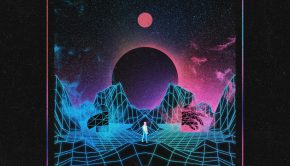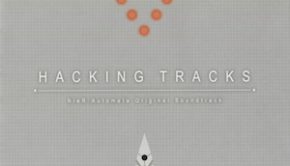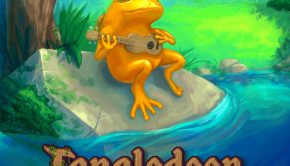Andrew Aversa (aka zircon) Interview: From Humble Beginnings
Andrew Aversa, also known as zircon, has broke into several musical scenes and industries at a young age. In addition to being a long-term member of OverClocked ReMix, he has scored numerous video games, ranging from indie favourites such as Return All Robots!, to official adaptations of Monkey Island and Street Fighter, to works that license his numerous music libraries. The artist has also inspired several original albums, including the multifaceted Antigravity.
In this interview, zircon reflects how his creative, flexible, and meticulous nature has allowed him to satisfy on a range of projects. He discusses highlights, such as directing Voices of the Lifestream, inspiring Antigravity, and meeting his wife Jillian. He also reflects that, despite featuring in scores as famous as Heroes, he has not forgotten his roots and continues to old-school favourites for the remix community to this day.
Interview Credits
Interview Subject: Andrew Aversa (aka zircon)
Interviewer: Matt Diener, Chris Greening
Editor: Chris Greening
Coordination: Matt Diener
Interview Content
Matt: Andrew Aversa, many thanks for speaking to us today. Can you please tell us how you began your career as a remixer and composer?
Andrew Aversa: My pleasure! You could say I began my career as a remixer when I started taking piano lessons at age seven, but I didn’t really get into ‘computer music’ until I was 15 or so. A friend of mine introduced me to some basic audio editing software, then a more complex loop-based program (Magix Music Maker 7 deLuxe.) Around that time, late 2002, I also discovered OverClocked ReMix. After hearing lots of songs from the OCR catalog, the first thing I wanted to do with this new music software was create my own remixes. The rest is history.

My influences have changed a great deal over time, and there are really too many to count. Early on, I was inspired by OC ReMixers like Disco Dan and McVaffe, as well as official arrange albums from games like Phantasy Star. Not long after, I developed a taste for trance — artists like Gouryella, DJ Tiesto, Ferry Corsten, and so on. After that, it was breakbeat and big beat artists in the vein of Crystal Method, Prodigy, Chemical Brothers. For the last few years, I’ve gravitated toward jazz fusion groups like Heavy Weather, Dimension and Jimsaku, as well as hard-hitting electronica like Pendulum.
Matt: Your first original game scores were Lazybrains and Fittest. Can you describe the experience of scoring these games from start to finish? As a gamer and remixer, was this a difficult transition to make?
Andrew Aversa: Actually, I did score some games before those — a handful of really indie titles back when I was in high school. The Adventures of Captain Genia on Shell Island was my very first score, done when I was 15. You can guess why I don’t have that listed on my credits page.
Anyway, in general, I find that it’s very difficult to score a game “in a vacuum”. I always find myself looking to references, be they existing game and movie scores or favorite composers, as a starting point. Most of the time, I don’t get to play the game I’m scoring, so it takes a lot of imagination. I focus on creating music that’s enjoyable to listen to in or out of the game context.
I wouldn’t say it was difficult to transition from playing and remixing games to creating original music for them. I’ve been a fan of video game music ever since I played my first SNES game (Final Fantasy Mystic Quest, the boss theme blew my mind) and so I jumped at the chance to create such music myself.
Matt: Recently, you completed a soundtrack for Space Whale Studio’s Return All Robots! Could you tell us more about your electronic and jazz approaches for this score? What inspired your decision to release its soundtrack in multiple formats?
Andrew Aversa: This was probably the most unique game score I’ve worked on yet. Since I was very involved with the development of the game (level design, even some programming) I had a lot of creative freedom. The art style of Return All Robots! is very quirky, with an emphasis on bright colors mixed with dark humor. It’s a mix between classic PC puzzle games, modern Flash games and 16-bit titles from the SNES era.
So, I wanted the score to resonate with older gamers first and foremost. If you listen to legendary soundtracks like Donkey Kong Country or Super Mario World, you’ll notice a surprising amount of jazz influence in terms of the writing, rhythm and chords, which is why I worked that into the RAR! soundtrack. Of course, you can’t have a game about robots and sci-fi gadgets without electronica too.
The decision to release the music in multiple formats on multiple platforms was really to help promote both the soundtrack and the game better. We knew some people would be willing to pay to get all the bonus tracks and lossless versions, but that plenty of people would have never heard of the game and wouldn’t necessarily be willing to plunk down money just to listen to the music. That’s why OC ReMix was a great vehicle for sharing the soundtrack with those who might not have otherwise listened.

Matt: Now you have an impact in the games industry, it would be interesting to hear your general perspective on scoring. To what extent do you think the role of video game music is both inside and outside the confines of the games themselves? Have your perspectives ever changed during the course of your career?
Andrew Aversa: This might sound like a cop-out, but I think the role of music really depends on the game. Some people complain that many modern game soundtracks just sound like ‘background music’, or that they’re ripping off Hollywood scores. I can understand the thought process behind that criticism, but if the game is supposed to essentially be an interactive Hollywood movie, then what’s the problem? There are plenty of indie games with retro-influenced soundtracks, which I think work great for those titles. That doesn’t mean the same approach can be used for the latest Call of Duty game.
In other words, while I always strive to make music that is interesting and enjoyable regardless of context, I believe that not all game music will necessarily ‘work’ outside of the game. That doesn’t mean it’s bad music. It might mean the music is really doing its job.
As for this perspective changing over my career, yes, it took me a while to come to this viewpoint. Early on, I was a big fan of the 8/16bit-influenced style. I suppose now that I’ve worked on some modern, non-indie games, I can see the other side of the fence.
Matt: Beyond game music, you have produced a number of original albums. Could you tell us about how these experiences compare and contrast with game scoring?
Andrew Aversa: For me, creating original music for an album is very different than scoring on a lot of levels. The inspiration for album music truly has to come from within. With a game score, you have your references, you have other people on the team giving their opinion, you have deadlines, milestone paychecks, etc. There are lots of factors motivating and influencing you to complete the work.
With an album, it’s a very pure expression of creativity, as cheesy as that sounds. I never set deadlines for my own original album material. I might say that I’d like to have a new album out by a certain date, but I don’t force myself to create. That’s why my latest album has been in the making since 2007. In comparison, I’ve written 26 pieces (and counting) for my latest game score over the last 6 months or so.
Matt: Which of your original albums are you most proud of?
Andrew Aversa: Actually that’s a tricky question. My compositional and production abilities improve every year, so I can’t look back on Phasma Elementum or Impulse Prime and say that they’re ‘better’ than Fittest, since the latter has so much more depth and breadth.
With all that in mind, however, I would say my favorite is still Antigravity. It took me about two years to create that album, which was a pure labor of love. Everything after that was written either for games or other media in mind (Mass Media Constant has it right in the name.) My thought process forAntigravity was basically pure in comparison, and I went through countless scrapped works-in-progress to create the final album. That’s the same process I’m going through now with my new upcoming album.

Matt: Beyond Antigravity, you display a broad knowledge of different world music styles on your original album The World Circuit. Is it safe to assume that you listen to a wide variety of music? How did you develop a taste for ethnic/regional music?
Andrew Aversa: Thank you, and yes, I do listen to a very wide variety! I used to listen to music basically 24/7, though now I enjoy silence from time to time. My Pandora radio stations include Bossa Nova, 40s-50s oldies, death metal, electro house and Bollywood, among other things.
My parents helped shape my early musical tastes. They listened to lots of classical music, jazz, showtunes, classic rock, instrumental guitar songs, and so on. It’s hard to say when I really became interested in ethnic/regional music specifically, as a result. My wife, Jillian Aversa, definitely had a part in it though, as she has been into New Age & World for her entire life (and we met back in 2005!)
Matt: When producing albums, you’re extensively involved in the sampling, mixing, and mastering processes. Can you tell us more about your studio set-up and what equipment you use to produce the desired sounds? Do you like to integrate performances into your music too?
Andrew Aversa: My setup has evolved a great deal over time, but fundamentally it consists of a high-powered music computer, FL Studio as a sequencer/workstation program, a MIDI keyboard and a pair of great headphones. I’ve had this basic setup since 2004.
The things that change are the components in the computer (I currently have a Core i7-950 with 3tb of storage, a SATA6 solid state drive, 12gb of RAM, etc.), the model of the MIDI keyboard(s) (currently, a Korg X50 and a Roland V-Synth), the headphones (Beyerdynamic DT880s since 2006) and my array of plugins and sample libraries. I went from using primarily free stuff with a couple pirated plugins back in 2003 and 2004 to an entirely legit setup consisting of dozens of high-end commercial sample libraries and virtual instruments.
I didn’t really start incorporating any live performances in my music until Antigravity in 2006 and 2007, when I featured guest performers like Jill, Jeremy Waters (GeoffreyTaucer on OCR) and Cain McCormack (Fishy). Since then, I’ve really wanted to add more of that human element to my music. My latest album features more vocal tracks and instrumental performances than any of my previous works. I even have a live choir on one of the tracks!
Matt: In addition to independent games and albums, your music has been featured in a variety of high-profile projects too. In particular, could you share your experiences producing music for licensing? Did you ever think your music would be heard on television, notably on Heroes?
Andrew Aversa: My first experience with licensing was in high school, after I released Impulse Prime in 2005. A small company specializing in providing music and SFX for radio stations contacted me and asked if I could create some custom music for them in the style of that album. In 2006, inspired by this success, I started researching the world of licensing and music libraries further and was able to place the entire album in a catalog. Since then, I’ve spent a good deal of time working to get my music in the hands of music supervisors and libraries who can then get it on various TV shows, in films, video games, ads and more.
For me, licensing is just a way of earning extra money from original music — it’s another income stream. In this day and age, album sales alone simply can’t pay the bills, so you have to look elsewhere for that. Nonetheless, I never thought my music would end up on shoes like Heroes! When I first heard about that from countless friends and acquaintances online, I was practically jumping for joy.

Matt: You continue to offer new music libraries through the brand Impact Soundworks. Could you elaborate on your recent offerings in this area? Can you tell us what your ultimate goal for the growth of Impact Soundworks is?
Andrew Aversa: Our most popular library to date has been “Shreddage”, a virtual electric guitar instrument designed for rock and metal rhythm playing. We also came out with “Koto Nation” in 2010, a collection of traditional Japanese instruments, plus “Acoustic Revolutions Volume 1”, which consists of adult contemporary guitar loops. We’ve got a ton of projects for 2011 lined up, most notably an expansion to the original Shreddage which makes it considerably more powerful and realistic, as well as several collections that feature instruments never sampled before.
The ultimate goal for Impact Soundworks is simply continued growth. My partner, fellow composer Will Roget, II, started the company in 2007 and I came on board in 2008. Since then, I’ve been primarily responsible for creating new libraries as well as managing the business, from upgrading and maintaining the website to publicity, marketing, social media, etc. I can’t wait for the day when we have a catalog of dozens of high-quality instruments with testimonials from major film, TV and game composers. We’re getting there, though!
Matt: Talking of high-profile projects, you helped to arrange and re-orchestrate the soundtrack ofMonkey Island 2 Special Edition, Peter McConnell’s first foray into game scoring. Could you describe what it was like working on the project? Was this a natural fit for your talent of remixing or were there more creative restrictions on what you could and couldn’t do?
Andrew Aversa: You might not expect this answer, but my experience as a remixer was not necessarily helpful on MI2SE in the way you might expect. We (the other arrangers and I) were tasked with staying quite faithful to the original works. The creative freedom came in our choice of instrumentation, writing parts for live performers, rewriting or revoicing certain harmonies or rhythms, and so on, as opposed to ‘remixing’ in the way that OCR encourages.
A lot of the work was quite technical, in a fun and challenging way. For example, the arranged soundtrack had to match up with the classic soundtrack perfectly, right down to the loop points in many cases. This way, the player can switch between them seamlessly. That was quite a task.
Matt: Through your work with OverClocked ReMix, you were also involved in Super Street Fighter II Turbo HD Remix. What was it like to collaborate with so many other artists on this high-profile project? What did you aim to convey when arranging Fei-Long’s theme?
Andrew Aversa: The SSF2THDR soundtrack was based primarily on the Blood on the Asphalt OCR album project, created by Shael Riley. That’s what I created the Fei Long remix for, initially. When I began working on editing for the game, I had no idea it was actually going to be for an official Capcom project. Neither did anyone else except djpretzel (David Lloyd) and Liontamer (Larry Oji), the executive producers of the soundtrack. We didn’t find out until most of the work was done!
Regardless, I would have approached Fei Long’s theme the same either way. As per the theme of BotA as an album (hard-hitting urban music), I wanted to have high-energy drums and big synths to keep the intensity up, while also blending traditional Eastern instruments. After all, Fei Long is based on Bruce Lee, who was as much a philosopher and writer as a brawler.

Matt: You also made well-received contributions to one of OverClocked ReMix’s most ambitious albums, namely Voices of the Lifestream. Can you tell us more about this project?
Andrew Aversa: As the director of Voices of the Lifestream and a major fan of the Final Fantasy VIIsoundtrack, creating remixes for the project was a very special experience.
It would take too long to describe my thoughts on each one, but for example, my collaboration with Jill (pixietricks) on “Deliverance of the Heart” had a lot of special meaning to me. The source tune, “Anxious Heart”, carries a lot of nostalgia for me, and it has a certain warmth and vulnerability that Jill expressed beautifully in her vocals and lyrics. It was also our first collaboration as a couple!
Matt: Among more recent projects, you were also involved in The Fabled Warriors, and Heroes vs. Villains in a non-directorial capacity. Can you tell us a bit about your remixes for these releases?
Andrew Aversa: For The Fabled Warriors, Darkesword (the director) asked me to contribute a remix at the 11th hour due to another remixer dropping out. I had a hard time initially coming up with an idea for the source tune, which I felt was rather plain and straightforward. Even after working on my remix for days on end, it still wasn’t ‘clicking’ until I figured out a way to carry the main melody properly with a combination of synths, strings and lots of effects. The end result, which has a very clear Pendulum influence, pretty much nails the spirit of Exdeath — an evil tree that hates the world.
With Heroes vs. Villains, again, I had difficulty coming up with an idea for arranging Ryu’s theme in a jazzy style (which is what Joshua Morse, po! and I agreed upon.) Ultimately, Josh helped me out by recording a great chord progression which then became the basis for the remix. Much like my Fei Long remix, I wanted to keep the Eastern influence for Ryu as well, because he’s a traditional guy. The jazz fusion artist Hiroshima was an inspiration here.
Matt: You and your wife Jillian are both young and extremely talented individuals that met on OverClocked ReMix. Can you tell us a bit about that?
Andrew Aversa: Yes, but I warn you, it’s a very geeky story. The first time I had ever heard Jillian was in a Final Fantasy VI remix of the opera theme, submitted sometime in 2004 or 2005. She wasn’t even credited, so I had no idea who she was. I had to vote NO on the remix, as the arrangement wasn’t very good, but I remarked in my vote that the vocalist was absolutely amazing, and that she had a world-class voice. Little did I know…!
Fast-forwarding to the end of 2005, members of the OCR forums were planning a meetup in New York City after Christmas. I had never met anyone from the Internet before, much less anyone from OCR specifically, but I decided to give it a shot and attend. It turned out that Jill was attending as well! Throughout the day of the meetup, we talked quite a bit and started to get to know each other. That evening, four meetup attendees (including Jill) headed back home with me to my parents’ house, where we stayed up remixing and goofing around all night (this resulted in the “Lover Reef” 5-way collaboration from Sonic 3.)
I spoke with Jill a little bit more online after this, but we weren’t yet talking to each other frequently. This changed when I saw her posting that the official OCR podcast she was co-hosting, VGDJ, needed a new theme song. I decided to give it a shot for fun, and before long, she managed to rope me into co-hosting the show myself. It got off to a rocky start at first, since I was very shy at the time, while Jill was both experienced and outgoing. However, over the course of several months, I loosened up, and during our countless hours recording on Skype, we got to know each other even better.
In the first half of 2006, we had two meetups in Philadelphia associated with VGDJ where Jill and I met in person again. She even hosted a meetup at her apartment in Baltimore to celebrate my 19th birthday. Through all of these in-person meetings and online conversations, we became good friends without the pretense of dating or romance hanging over our heads. Finally, at a “hosts-only” meetup on July 4, 2006, I picked up on some not-so-subtle hints that Jill was quite fond of me, and we started dating.
As you might imagine, things went quite well after that! We saw each other almost every weekend after that and spent several full summers living together. I proposed to her at the end of 2008 and we were married on July 26, 2009. 🙂

Matt: Also, we’re very curious to know what inspired the nickname zircon?
Andrew Aversa: It’s actually a pretty silly story. Before I started creating music, I was really interested in designing and creating video games. I spent a lot of time on IRC making (and playing) text-based RPGs, and went so far as to create an entire MUD which could be played by lots of people at once.
One of my virtual friends and fans at the time went by the handle ‘Argon’. I was looking to create a website to showcase my games around then, and needed a name for it. Since I thought ‘Argon’ sounded cool, and since argon is an element on the periodic table, I looked the other end of the table for another cool-sounding element to use for myself. I saw ‘Zircon’ and thus ‘Zircon Studios’ was born. It wasn’t until early 2003 that I even started using this as an artist name, however. Before that, I went by something else. I’m not saying what, though.
Matt: Many thanks for your time today, Andrew Aversa. To finish, could you tell us what we might expect from your future activities in game scoring and album production? Do you have anything that you’d like to say for your fans who will be reading this?
Andrew Aversa: Thank you for having me! Out of all my upcoming projects, I’m most excited about my next album, which I hope to release on June 23, 2011. It’s a concept album inspired by the imagery and philosophy of Ghost in the Shell, Blade Runner, and other classic anime and movies that deal with the question “what makes us human?” The main character of the album is a female android that is ‘born’, explores the sensation of existence/sentience, and gradually realizes she is not actually alive. Of course, the music is far more subtle and abstract than that, but you get the idea! This album will be the true spiritual successor to Antigravity, with a variety of electronic genres, vocal tracks, live instrumental performances and a blend of organic and synthetic elements.
To all the fans reading this, I want to say thank you for everything — for listening to my remixes and original work, buying albums, sending emails, commenting on videos, posting on my Facebook wall, and everything in between. These things all inspire and motivate me to continue learning, and to exceed your expectations with every new piece!
Posted on March 1, 2011 by Matt Diener. Last modified on March 2, 2014.














